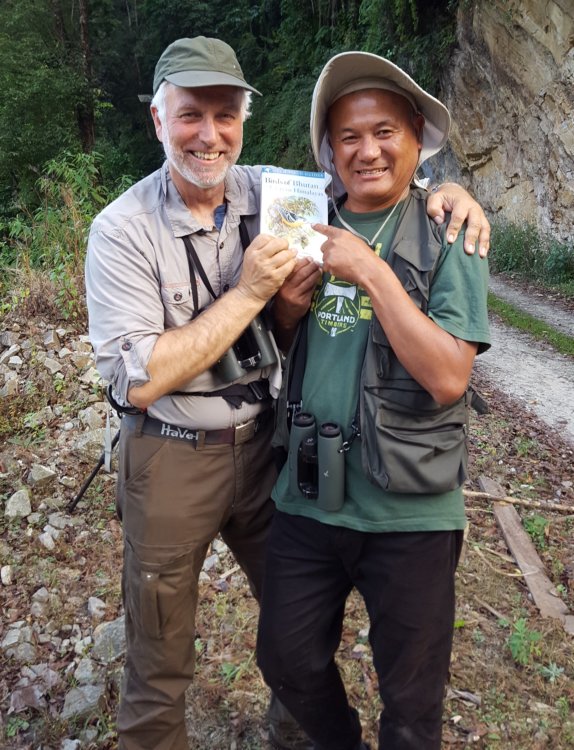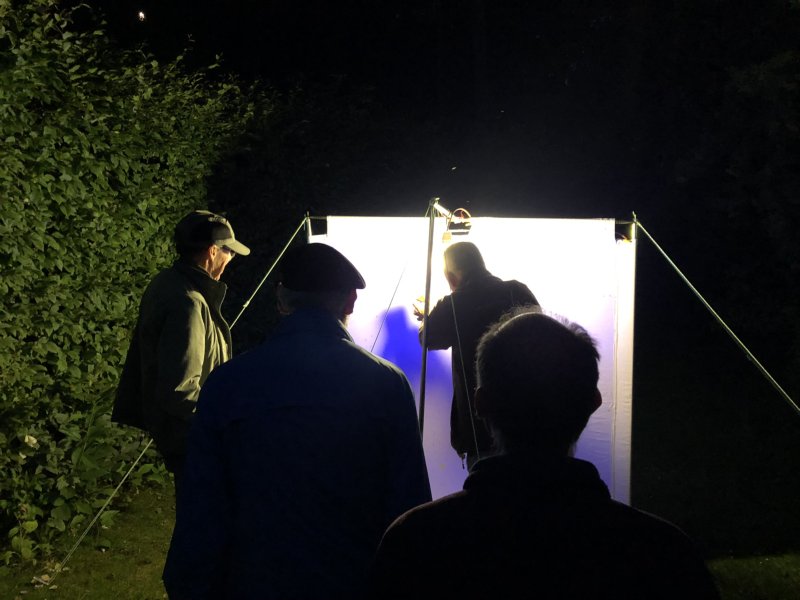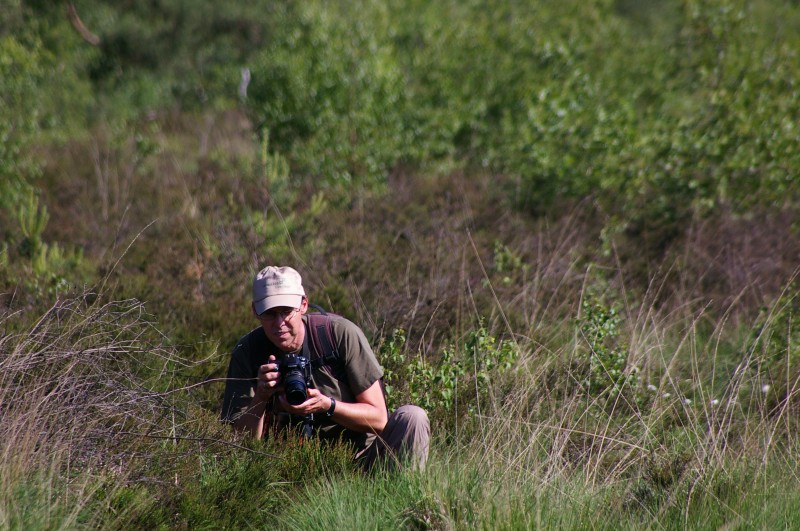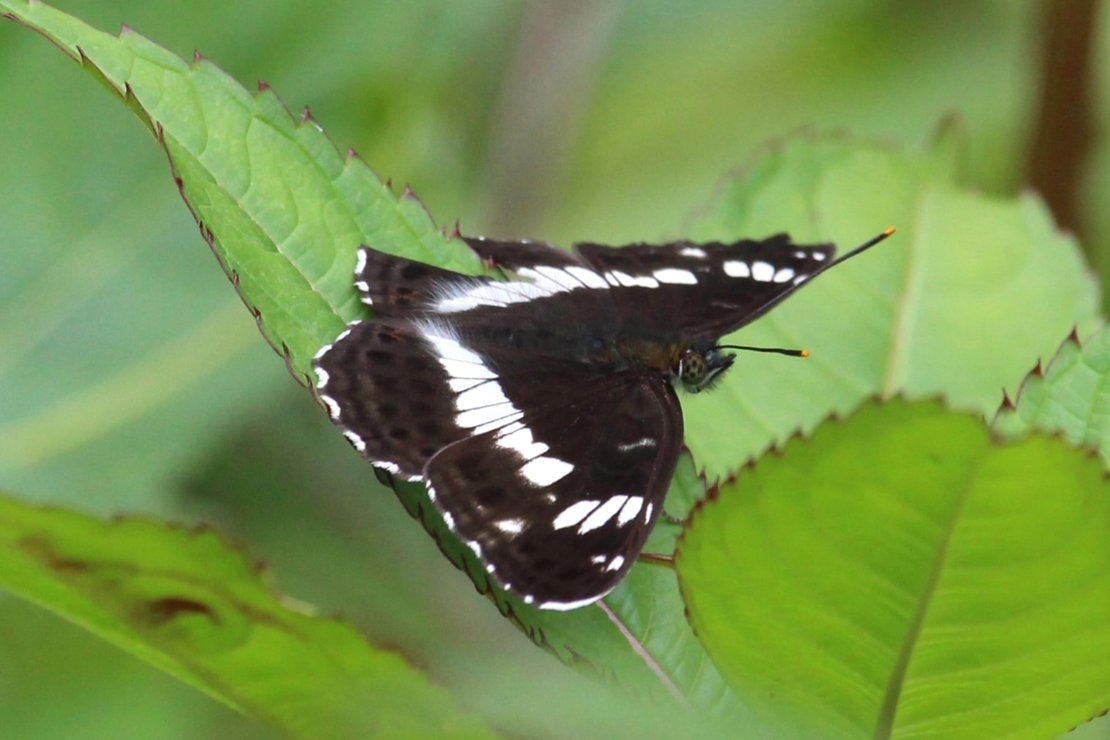From May 22 to June 22, the University of Twente participated in the BioBlitz; an initiative of several universities and colleges. A large number of higher educational institutions tried to register as many plant and animal species as possible in one month. Afterwards, the UT proved to have achieved a creditable second place. Spearheads Rolf de By and Wim Bakker of the ITC faculty talk about this experience, discovering special species on campus and the importance of a good biodiversity policy.
You can rightfully call Wim and Rolf nature hobbyists. "I've been interested in biology in general for up to 25 years," Wim begins. "I am also a board member of the KNNV Enschede (nature association for field biology) and in that time I have learned a lot about birds, insects, dragonflies, grasshoppers and more." Rolf adds: "I have been an avid birder and nature lover since I was 12 years old."

Rolf de By (Left)
On an aDventure around campus
That is why the gentlemen did not have to think twice when Brechje Marechal, program manager of the SEE programme, asked them to participate in the BioBlitz. "It's fun to 'score' new species and discover new things. For example, I've already seen 3,000 different species. That may sound like a high number, but there are 50,000 plant and animal species in the Netherlands alone. So there is still plenty for me to discover," Wim explains enthusiastically.
Rolf: "The same kind of enthusiasm arose in me. I also really liked the competitive element. A 'battle' with Wageningen, a university where a lot of people participated, ensued during the BioBlitz. As a technical university, there are naturally fewer candidates with an interest in nature here. With a club of 10, consisting of colleagues working on campus and a few enthusiasts from our knowledge network, we set to work."
And then, "At some point, everyone started having tremendous fun on that adventure around campus. You learn to see things differently, and the more you know about the different species, the more you appreciate them too. As far as I'm concerned, the BioBlitz was a tremendously good tool to give more visibility to the biodiversity on our campus; in four weeks we saw over 1,000 species. I didn't think that was possible beforehand and I find that very fascinating! I think a BioBlitz helps well to create awareness that biodiversity is a hugely important issue. Not just for UT, but for the whole world."
Special species
What did Rolf and Wim like the most about the BioBlitz? "It has been a fun, intensive process. Because the club was so small, there was room for initiative and crazy things. One Wednesday evening we counted moths with special lights and tried to find water creatures with nets. In our shared Whatsapp group, the craziest sightings came along. You might think: I've been here so long, I've seen everything on campus by now. On the contrary, you discover many new things. A few bugs that unexpectedly set up camp in the Pinetum, for example. That provides satisfaction and makes it a lot of fun to do," Wim says.

"The spontaneity with which it went was tremendous fun. You end up thinking more about how special nature is on our campus. For example, 119 different species of (lichen) mosses can be found on campus alone. I find that bizarre!", laughs Rolf.
"Discovering special species is also a lot of fun. The best part is when you only find out in the evening how special it is what you saw. Take for example the Juniper red bug we found. Since 2000 there have only been 50 sightings of this species in the Netherlands," said an enthusiastic Wim.
"As a language enthusiast, I also get a kick out of all the beautiful unique names for species. The Mile End Jumping Spider, for example. Or an Golden-haired Robberfly! You could write a comic strip about that," laughs Rolf.

Wim Bakker
The results
Wim: "We ended up second, just behind Wageningen. We had relatively few people competing compared to them, so we searched very specifically. We now know where our strengths and weaknesses lie. When we participate next time, we will be even more focused."
Top 3 BioBlitz 2024
Wageningen University: 6583 observations, 1088 unique species
University of Twente: 4060 observations, 1023 unique species
Utrecht University: 2644 sightings, 775 unique species
Rolf: "We are of course proud of the final result, but at the same time we also consider the higher goal; the beautiful and rare things you find. We found 330 unique species that had not been observed on campus before. That's very special. With the BioBlitz, we were able to shine a light on all the beauty that can be found here. I think there will be many more great finds in the future." He expresses a wish for next year: "It was great fun to be so intensely involved with a small club, but I actually think it is much more important that twice as many people participate next year! After all, that would mean that we have created more awareness."

The 'White Admiral' butterfly. Photo: Petra Budde
Continued efforts in biodiversity promotion
Diversification of the campus, annual Visual Tree Assessments, flora and fauna checks. There are already many plans and initiatives within UT to promote biodiversity. What more can UT do? "Fortunately, a lot is already happening. Think of forests left alone and sides along ponds kept rough. Of course, we don't think it's happening fast enough, but awareness is slowly growing. The outcome of the BioBlitz is very interesting and could help in the targeted improvement of biodiversity," Wim explains.
Rolf: "Wim and I sit together on the biodiversity council, which was recently established. The BioBlitz has shown that there is high potential on campus. We are, of course, facing a decline nationally in terms of biodiversity. UT should try to take a defensive line to keep the potential as high as possible, and expand where we can. There are plenty of ideas we could do something with."
"Awareness is very important. So is variety and heterogeneity. Hopefully we can enthuse even more people. In ten years, we want to reach 2,000 unique species with a BioBlitz. Let's work together to ensure that the special nature on our campus has room to exist and to expand!"
Courtesy of the Climate Centre, available information about biodiversity on campus will be shared online in the Biodiversity Insights project by the end of 2024. You can find information about biodiversity on campus on the SEE website.
Sustainability at UT
Sustainability is an important priority area of Shaping2030, the University of Twente’s strategic plan. In addition to finding sustainable solutions for societal issues, the UT wants to set a good example of what it means to be a sustainable organisation. To reach this goal, the ambitions of Shaping2030 need to be put into practice. Many members of the UT community are hard at work translating the sustainability objectives into our work on campus – transforming the way we work, teach, learn, travel, build and more. In this series, we invite them to talk about what motivates them, what the role of sustainability is in their day-to-day work, and what they would like to achieve at our university.
Want to find out more about sustainability at UT? Please go to utwente.nl/sustainability.
Written by Stef Meilink





